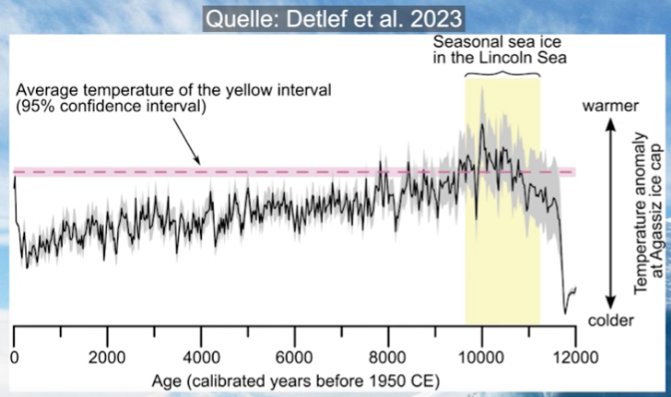https://wattsupwiththat.com/2024/01/15/big-claims-about-tiny-numbers/
by Willis Eschenbach
Excerpt: A new paper yclept “New Record Ocean Temperatures and Related Climate Indicators in 2023“. … There’s a fascinating claim in the abstract, viz:
In 2023, the sea surface temperature (SST) and upper 2000 m ocean heat content (OHC) reached record highs. The 0–2000 m OHC in 2023 exceeded that of 2022 by 15 ± 10 ZJ (1 Zetta Joules = 1021 Joules) (updated IAP/CAS data); 9 ± 5 ZJ (NCEI/NOAA data).
So … what is the relationship between ZJ and the temperature of the top 2000 meters? Let me use the NCEI/NOAA data. Here are the calculations, skip them if you wish, the answer’s at the end. Items marked as [1] are the computer results of the calculation. Everything after a # is a comment.
> (seavolume=volbydepth(2000)) #cubic kilometers
[1] 647,988,372
> (seamass = seavolume * 1e9 * 1e3 * 1.025) # kg
[1] 6.641881e+20
> (specificheat=3850) # joules/kg/°C
[1] 3850
> (zjoulesperdeg=specificheat * seamass / 1e21) #zettajoules/°C, to raise seamass by 1°C
[1] 2557.124
> (zettajoules2023 = 9) # from the paper
[1] 9
> (tempchange2023 =zettajoules2023 / zjoulesperdeg) # °C
[1] 0.0035
So all the angst is about a temperature change of three and a half thousandths of one degree. EVERYONE PANIC!!
But that wasn’t the interesting part. The interesting part is their uncertainty, which per NCEI/NOAA is ± 5 ZJ. Let me note to start that the results of the two groups, IAP/CAS and NCEI/NOAA, differ by 6 ZJ …
Using the above calculations, 5 ZJ is ± 0.0019°C … they are seriously claiming that we can measure the temperature of the top 2,000 meters of the ocean to within ±0.0019°C.
And how are they doing that?
They say “The main subsurface observing system since 2005 is the profiling floats from the Argo program”. These are amazing floats that sleep a thousand meters down deep in the ocean, then periodically wake up, sink further down to two thousand meters, and then rise slowly to the surface, measuring temperature and salinity along the way. When they reach the surface, they phone home like ET, report the measurements, and sink down a thousand meters to go to sleep again. They’re a fascinating piece of technology. Here’s a map of the float locations from a few years back.
…

There are about 4,000 floats, each of which measures the temperature as it rises from 2000 meters up to the surface every 10 days. Note that they tend to concentrate in some areas, like the intertropical convergence zone by the Equator and the US East Coast, while other areas are undersampled.
So to start with, ignoring the uneven sampling. each float is theoretically representative of an area of about 92,000 square kilometers and down to two kilometers depth. That’s a bit more area than Austria, Portugal, or the state of South Carolina.
Now consider their claim for a moment. We put one single thermometer in Austria, take one measurement every 10 days for a year … and claim we’ve measured Austria’s annual average temperature with an uncertainty of ±0.0019°C???
Yeah … that’s totally legit …
But wait, as they say on TV, there’s more. That’s just measuring the surface temperature, but the Argo floats are measuring a 3D volume, not the surface. So their claimed uncertainty is even less likely.
Here’s another way to look at it. We’re talking about the uncertainty of the average of a number of measurements. As we get more measurements, our uncertainty decreases … but it doesn’t decrease directly proportionally to the number of measurements.
Instead, it decreases proportionally to the square root of the number of measurements. This means if we want to decrease the uncertainty by one decimal point, that is to say we want to have one-tenth of the uncertainty, we need one hundred times as many measurements.
And of course, this works in reverse as well. If we have one-hundredth of the number of measurements, we lose one decimal point in the uncertainty.
So let’s apply that to the ARGO floats.
Claimed uncertainty with 4,000 floats = ± 0.0019°C
Therefore, uncertainty with 40 floats = ± 0.019°C
And uncertainty with 4 floats = ±0.19 time the square root of 10 = 0.06°C …
Their claimed uncertainty says that four ARGO floats could measure the temperature of the entire global ocean to an uncertainty of less than one tenth of one degree … yeah, right.
Sadly, I fear that’s as far as I got in their paper … I was laughing too hard to continue. I’m sure it’s all sciency and everything, but they lost me by hyperventilating over an ocean warming of three and a half thousandths of a degree and put me over the edge by claiming an impossibly small uncertainty.
Here, a sunny morning in the redwood forest after a day of strong rain, with football playoffs (not the round ball kind) starting in a little while—what’s not to like?
#
Willis Eschenbach: A new paper yclept “New Record Ocean Temperatures and Related Climate Indicators in 2023“ … So all the angst is about a temperature change of three and a half thousandths of one degree. EVERYONE PANIC!! But that wasn’t the interesting part. The interesting part is their uncertainty… Their claimed uncertainty says that four ARGO floats could measure the temperature of the entire global ocean to an uncertainty of less than one tenth of one degree … yeah, right.
Sadly, I fear that’s as far as I got in their paper … I was laughing too hard to continue. I’m sure it’s all sciency and everything, but they lost me by hyperventilating over an ocean warming of three and a half thousandths of a degree and put me over the edge by claiming an impossibly small uncertainty.
#




